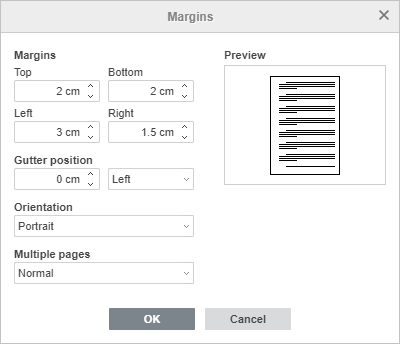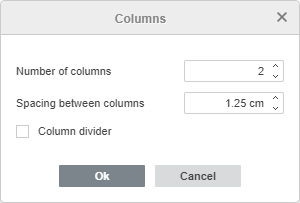Set page parameters
To change page layout, i.e. set page orientation and size, adjust margins and insert columns, use the corresponding icons at the Layout tab of the top toolbar.
Note: all these parameters are applied to the entire document. If you need to set different page margins, orientation, size, or column number for the separate parts of your document, please refer to this page.
Page Orientation
Change the current orientation type clicking the
Orientation icon. The default orientation type is Portrait that can be switched to Album.Page Size
Change the default A4 format clicking the
Size icon and selecting the needed one from the list. The available preset sizes are:- US Letter (21,59cm x 27,94cm)
- US Legal (21,59cm x 35,56cm)
- A4 (21cm x 29,7cm)
- A5 (14,81cm x 20,99cm)
- B5 (17,6cm x 25,01cm)
- Envelope #10 (10,48cm x 24,13cm)
- Envelope DL (11,01cm x 22,01cm)
- Tabloid (27,94cm x 43,17cm)
- AЗ (29,7cm x 42,01cm)
- Tabloid Oversize (30,48cm x 45,71cm)
- ROC 16K (19,68cm x 27,3cm)
- Envelope Choukei 3 (11,99cm x 23,49cm)
- Super B/A3 (33,02cm x 48,25cm)
You can also set a special page size by selecting the Custom Page Size option from the list. The Page Size window will open where you'll be able to select the necessary Preset (US Letter, US Legal, A4, A5, B5, Envelope #10, Envelope DL, Tabloid, AЗ, Tabloid Oversize, ROC 16K, Envelope Choukei 3, Super B/A3, A0, A1, A2, A6) or set custom Width and Height values. Enter your new values into the entry fields or adjust the existing values using arrow buttons. When ready, click OK to apply the changes.

Page Margins
Change default margins, i.e. the blank space between the left, right, top and bottom page edges and the paragraph text, clicking the
Margins icon and selecting one of the available presets: Normal, US Normal, Narrow, Moderate, Wide. You can also use the Custom Margins option to set your own values in the Margins window that opens. Enter the necessary Top, Bottom, Left and Right page margin values into the entry fields or adjust the existing values using arrow buttons.
Gutter position is used to set up additional space on the left or top of the document. Gutter option might come in handy to make sure bookbinding does not cover text. In Margins window enter the necessary gutter position into the entry fields and choose where it should be placed in.
Note: Gutter position function cannot be used when Mirror margins option is checked.
In Multiple pages drop-down menu choose Mirror margins option to to set up facing pages for double-sided documents. With this option checked, Left and Right margins turn into Inside and Outside margins respectively.
In Orientation drop-down menu choose from Portrait and Landscape options.
All applied changes to the document will be displayed in the Preview window.
When ready, click OK. The custom margins will be applied to the current document and the Last Custom option with the specified parameters will appear in the
Margins list so that you can apply them to some other documents.You can also change the margins manually by dragging the border between the grey and white areas on the rulers (the grey areas of the rulers indicate page margins):
Columns
Apply a multi-column layout clicking the
Columns icon and selecting the necessary column type from the drop-down list. The following options are available:- Two - to add two columns of the same width,
- Three - to add three columns of the same width,
- Left - to add two columns: a narrow column on the left and a wide column on the right,
- Right - to add two columns: a narrow column on the right and a wide column on the left.
If you want to adjust column settings, select the Custom Columns option from the list. The Columns window will open where you'll be able to set necessary Number of columns (it's possible to add up to 12 columns) and Spacing between columns. Enter your new values into the entry fields or adjust the existing values using arrow buttons. Check the Column divider box to add a vertical line between the columns. When ready, click OK to apply the changes.

To exactly specify where a new column should start, place the cursor before the text that you want to move into the new column, click the
Breaks icon at the top toolbar and then select the Insert Column Break option. The text will be moved to the next column.Added column breaks are indicated in your document by a dotted line:
. If you do not see the inserted column breaks, click the icon at the Home tab of the top toolbar to display them. To remove a column break select it with the mouse and press the Delete key.To manually change the column width and spacing, you can use the horizontal ruler.
To cancel columns and return to a regular single-column layout, click the
Columns icon at the top toolbar and select the One option from the list.